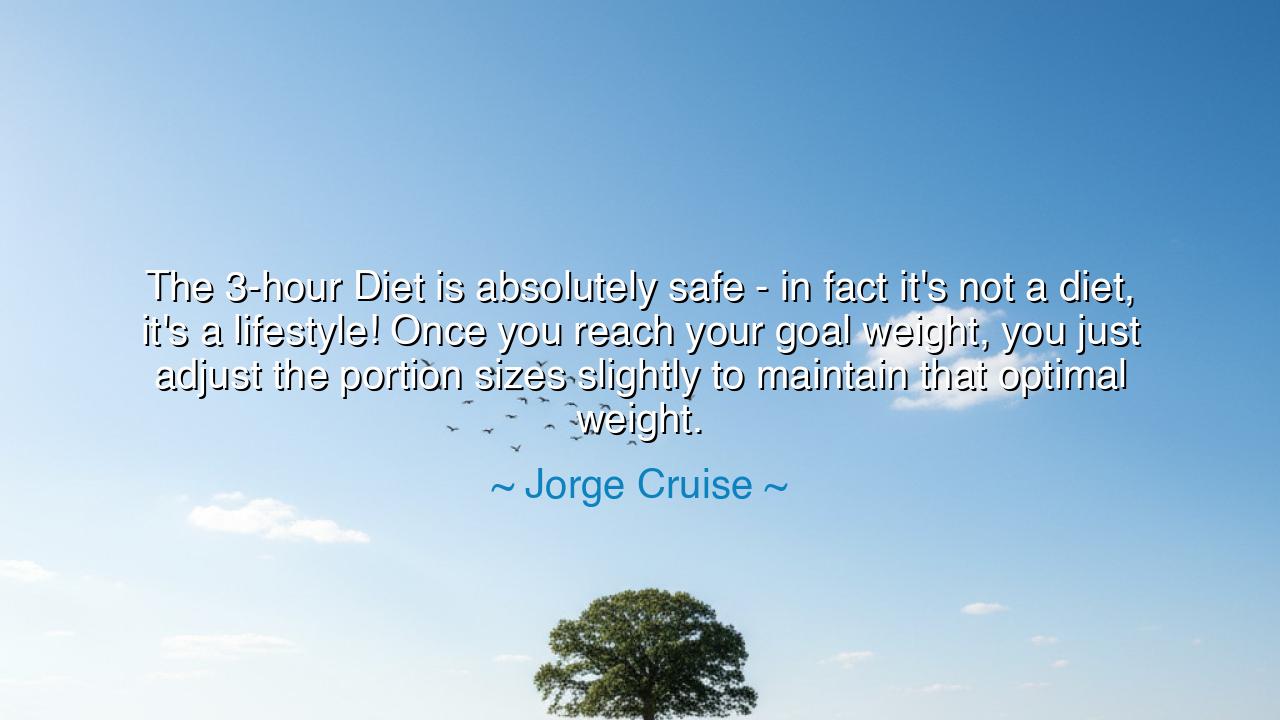
The 3-hour Diet is absolutely safe - in fact it's not a diet
The 3-hour Diet is absolutely safe - in fact it's not a diet, it's a lifestyle! Once you reach your goal weight, you just adjust the portion sizes slightly to maintain that optimal weight.






In the age-old dance of life, where every action, every choice, has its consequence, the path to health and well-being is one that requires discipline, awareness, and balance. Jorge Cruise in his reflection on the 3-hour diet speaks to this timeless truth: "The 3-hour diet is absolutely safe - in fact, it's not a diet, it's a lifestyle! Once you reach your goal weight, you just adjust the portion sizes slightly to maintain that optimal weight." In these words, Cruise unveils a fundamental principle: that true health is not found in extreme measures, but in the steady, consistent choices that we make day by day. The 3-hour diet is not a passing trend, but a transformation—one that builds not just a temporary change, but a new, sustainable way of living.
The ancients understood that true strength, vitality, and longevity did not arise from extreme measures, but from moderation and balance. Consider the words of Hippocrates, the father of modern medicine, who famously said, "Let food be thy medicine and medicine be thy food." This sentiment has echoed through centuries, calling us to recognize the powerful role nutrition plays in shaping our physical and spiritual health. Cruise’s approach to diet aligns with this ancient wisdom—he speaks not of restrictive, short-term solutions but of creating a lifestyle that honors both the body’s needs and its limits. Just as Hippocrates taught that the right food is the foundation of health, Cruise teaches that balanced nutrition—eaten in moderation and at regular intervals—is the true path to vitality.
The concept of balance is not foreign to the teachings of Aristotle, who believed that the key to living a virtuous life was the ability to navigate between extremes. In his writings, Aristotle emphasized the importance of moderation in all things, recognizing that to live a truly healthy life, one must practice self-control and wisdom in their daily actions. The 3-hour diet, with its principle of portion control and regular eating intervals, mirrors this ancient philosophy. Just as Aristotle recognized that the pursuit of health and virtue requires balance—Cruise urges us to cultivate a way of eating that is sustainable and nourishing, not rooted in extremes but grounded in thoughtful, consistent practice.
Think of the warriors of ancient Sparta, who were known for their discipline, endurance, and strength. The Spartans, while fierce in battle, also understood the power of balance in their physical training and their diet. They practiced moderation, eating simple, nourishing foods that provided them with strength without indulgence. The Spartan way was not about indulging in excessive meals or restricting oneself to extremes, but about sustaining the body with the fuel it needed for both physical strength and mental clarity. Much like the Spartan warriors, the 3-hour diet emphasizes steady, regular nourishment—a lifestyle of balance that fuels the body without overwhelming it.
The Romans, too, embraced the idea of balance and discipline in their approach to health. Seneca, the Stoic philosopher, frequently spoke of the importance of self-control and moderation in all aspects of life, from wealth to diet. To the Romans, true greatness lay not in indulging in excess but in cultivating steady, disciplined habits that would sustain both the body and the mind. Cruise’s concept of portion control and regular intervals for eating aligns with the Stoic teachings of moderation—a key element in the path to health and wisdom. The Romans knew that a life lived in moderation, in balance, was a life of strength and endurance—a life that could withstand the trials of time and circumstance.
The Buddhist tradition also offers insights into the value of balance in our lifestyle choices. The Buddha taught that the path to enlightenment lies not in indulgence or asceticism but in the middle way—a life of moderation that nourishes the body and mind without excessive attachment. The Buddhist teachings on mindful eating align with the principles of the 3-hour diet. Just as the Buddha encouraged his followers to eat with awareness and moderation, Cruise advises us to cultivate a mindful relationship with food—one that honors our body’s needs while avoiding both the excesses of indulgence and the dangers of deprivation. Moderation, in both eating and living, is the key to long-term well-being.
Thus, we are reminded of an essential lesson: health and vitality are not the products of extreme measures or temporary fixes, but of consistent, balanced choices that align with the body’s natural rhythms. Jorge Cruise teaches us that the 3-hour diet is not a fad, but a lifestyle—one that emphasizes moderation, portion control, and regular nourishment to create a foundation of enduring health. In the same way that the ancients—from Hippocrates to the Spartans, from Aristotle to the Buddhists—recognized the power of balance, so too must we embrace a path of steady, mindful living that supports both the body and mind.
Let this wisdom guide your own life. Instead of chasing after fleeting trends or extreme diets, seek to build a lifestyle that nourishes you consistently, that honors your body’s needs while offering it the freedom to thrive. Like the ancients, let moderation, balance, and discipline be your guide. Choose a path that offers nourishment, not through indulgence or deprivation, but through consistent, thoughtful choices that support your health and well-being. Through the steady rhythm of moderation and mindfulness, you can build a life that is strong, vibrant, and sustainable.






AAdministratorAdministrator
Welcome, honored guests. Please leave a comment, we will respond soon